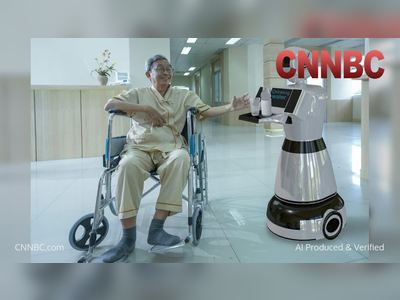Tens of Thousands of Young Chinese Get Up Every Morning and Go to Work Where They Do Nothing
Because they have no real job, they simply pay to sit in a mock office and appear as if they are part of the bigger game. This is not an esoteric phenomenon, but a reflection of the fracture experienced by Generation Z worldwide after losing faith in the old order and the promise of a secure future.
Across China’s major cities, a curious new industry has emerged: fake offices where young people pay to act as though they are employed.
Each morning, countless members of Generation Z dress for work, commute to an office, and sit at desks, though no employer awaits them and no tasks are assigned.
For a fee of thirty to fifty yuan — roughly four to seven U.S. dollars — they purchase a seat, internet access, coffee, and snacks.
What they are truly buying is a routine, the illusion of stability, and a place in which they can appear to be part of the professional world.
Some use these hours productively: refining résumés, networking, or brainstorming future projects.
Others simply pass time online or distract themselves.
Either way, the motivation goes beyond work.
These offices provide a shield against loneliness, a means of coping with relentless social pressure, and a way to maintain appearances for family and peers who expect progress and career advancement.
In cities like Shanghai, Shenzhen, Chengdu, and Wuhan, thousands are choosing this path to escape the stigma of staying home and to preserve a sense of identity.
The trend speaks to a deeper rupture in the social contract.
For decades, Chinese youth were told that education and hard work would secure stability.
That promise has frayed.
Youth unemployment officially stands near eighteen percent, though independent researchers believe the true figure exceeds forty percent.
Universities, under pressure to showcase high placement rates, have even been accused of inflating statistics by encouraging false employment reporting.
For the most educated generation in China’s history, many of whom hold university degrees, the gap between expectations and reality has left profound disillusionment.
The psychological impact is severe.
Rising anxiety and depression among recent graduates reflect not only job scarcity but the collapse of a once-stable pathway to adulthood.
Online platforms such as Douyin, Bilibili, and Xiaohongshu both magnify and mitigate the problem: they bombard users with images of success and luxury while also offering forums where disillusioned youth can vent, share, and connect with others in similar straits.
Subcultures like 'Lying Flat' — rejecting the relentless pursuit of status — and the so-called 'Rat People' who live minimal lives in cramped spaces, have become new identities.
Once derogatory, these terms now empower young people to express exhaustion, detachment, and resistance to the old system.
The mock office is, in effect, another adaptation.
It lets those unwilling to withdraw entirely continue playing the part, while signaling a shift in how work itself is defined.
Showing up, being seen, and belonging may matter as much as output.
This is not only a Chinese story.
Similar patterns appear globally: Japan’s 'Freeters' and 'Hikikomori,' America and Europe’s 'Quiet Quitting,' and Europe’s NEET generation reveal a worldwide generational fracture.
Young people, East and West, are rethinking what work means, and whether the old promises of education, labor, and loyalty can still be trusted.
For China’s leadership, the stakes are high.
Disillusioned youth are not just an economic liability but a potential political risk.
History shows how unemployed and alienated generations can drive upheaval.
Yet the official response has often been data suppression rather than structural solutions.
The deeper crisis plays out quietly — in online networks, in basement apartments, and in these rented office chairs.
The question is whether this is a passing phase of economic hardship or the beginning of a lasting cultural transformation, where work and identity diverge and community, belonging, and survival take their place at the center.
Each morning, countless members of Generation Z dress for work, commute to an office, and sit at desks, though no employer awaits them and no tasks are assigned.
For a fee of thirty to fifty yuan — roughly four to seven U.S. dollars — they purchase a seat, internet access, coffee, and snacks.
What they are truly buying is a routine, the illusion of stability, and a place in which they can appear to be part of the professional world.
Some use these hours productively: refining résumés, networking, or brainstorming future projects.
Others simply pass time online or distract themselves.
Either way, the motivation goes beyond work.
These offices provide a shield against loneliness, a means of coping with relentless social pressure, and a way to maintain appearances for family and peers who expect progress and career advancement.
In cities like Shanghai, Shenzhen, Chengdu, and Wuhan, thousands are choosing this path to escape the stigma of staying home and to preserve a sense of identity.
The trend speaks to a deeper rupture in the social contract.
For decades, Chinese youth were told that education and hard work would secure stability.
That promise has frayed.
Youth unemployment officially stands near eighteen percent, though independent researchers believe the true figure exceeds forty percent.
Universities, under pressure to showcase high placement rates, have even been accused of inflating statistics by encouraging false employment reporting.
For the most educated generation in China’s history, many of whom hold university degrees, the gap between expectations and reality has left profound disillusionment.
The psychological impact is severe.
Rising anxiety and depression among recent graduates reflect not only job scarcity but the collapse of a once-stable pathway to adulthood.
Online platforms such as Douyin, Bilibili, and Xiaohongshu both magnify and mitigate the problem: they bombard users with images of success and luxury while also offering forums where disillusioned youth can vent, share, and connect with others in similar straits.
Subcultures like 'Lying Flat' — rejecting the relentless pursuit of status — and the so-called 'Rat People' who live minimal lives in cramped spaces, have become new identities.
Once derogatory, these terms now empower young people to express exhaustion, detachment, and resistance to the old system.
The mock office is, in effect, another adaptation.
It lets those unwilling to withdraw entirely continue playing the part, while signaling a shift in how work itself is defined.
Showing up, being seen, and belonging may matter as much as output.
This is not only a Chinese story.
Similar patterns appear globally: Japan’s 'Freeters' and 'Hikikomori,' America and Europe’s 'Quiet Quitting,' and Europe’s NEET generation reveal a worldwide generational fracture.
Young people, East and West, are rethinking what work means, and whether the old promises of education, labor, and loyalty can still be trusted.
For China’s leadership, the stakes are high.
Disillusioned youth are not just an economic liability but a potential political risk.
History shows how unemployed and alienated generations can drive upheaval.
Yet the official response has often been data suppression rather than structural solutions.
The deeper crisis plays out quietly — in online networks, in basement apartments, and in these rented office chairs.
The question is whether this is a passing phase of economic hardship or the beginning of a lasting cultural transformation, where work and identity diverge and community, belonging, and survival take their place at the center.











